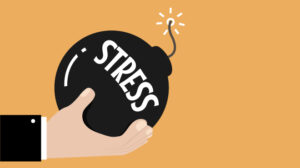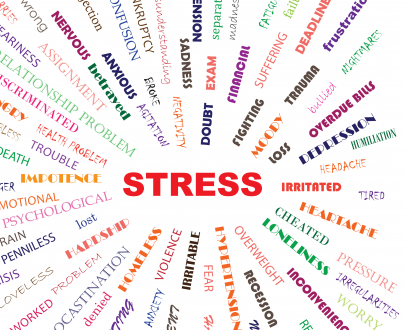We all know that feeling. That tightness in our chest, the racing heart, and the sense that we’re about to explode. We call it stress, and it seems to be a part of our everyday lives. Stress can be caused by many different things, including work, relationships, money, or even just the daily grind. In this blog post, we will discuss the four types of stress that we experience in our daily lives and how to deal with them!
Contents
Defining Stress
 We are no strangers to the word “stress”. We hear and feel it on a daily basis. But what exactly is stress? Stress is our body’s response to any demand placed on it. When we perceive a threat, our bodies go into “fight-or-flight” mode. This ancient survival mechanism kicks in and prepares us to deal with the perceived threat. The stress response is a natural and necessary part of life. It helps us to stay alert and focused in times of danger.
We are no strangers to the word “stress”. We hear and feel it on a daily basis. But what exactly is stress? Stress is our body’s response to any demand placed on it. When we perceive a threat, our bodies go into “fight-or-flight” mode. This ancient survival mechanism kicks in and prepares us to deal with the perceived threat. The stress response is a natural and necessary part of life. It helps us to stay alert and focused in times of danger.
Contrary to popular beliefs, some amount of stress can actually be healthy. For instance, a little bit of stress can help us to stay motivated and on task. It can also provide us with the energy we need to get through a tough workout or an important project. However, too much stress can have negative effects on our health, both physical and mental. It can consequent in a number of health problems, including heart disease, high blood pressure, anxiety, and depression.
What Are The 4 Types Of Stress?
Stress is a rather broad spectrum. It can be caused by many different things, both big and small. Although the causes of stress may be different, the effects are often the same. The types and causes of stress can be endless. Dr. Karl Albrecht, an industrial and organizational psychologist, came up with a model that divides stressors into four different categories. These are as follows.
Time stress
 As the name may be suggestive, time stress has to do with our perception of time. This type of stress is often caused by a feeling of being pressed for time or running late. Time stress can also be caused by a fear of the future or a feeling of being unprepared.
As the name may be suggestive, time stress has to do with our perception of time. This type of stress is often caused by a feeling of being pressed for time or running late. Time stress can also be caused by a fear of the future or a feeling of being unprepared.
This can be better understood with examples. Some common occurrences of time stress are as follows.
- You’re running late for an important meeting
- You have a big project due at work and you’re not sure if you can get it done on time
- You’re worried about an upcoming test or presentation
- You’re dreading a family gathering or social event
- You have a looming deadline
The main distinction between time stress from other types of stress is that it is often self-induced. We often put unnecessary pressure on ourselves to meet unrealistic deadlines or to be perfect in everything we do. This can lead to a feeling of being overwhelmed and stressed out. Moreover, it also creates a sense of time urgency, which can lead to unhealthy behaviors such as skipping meals or not getting enough sleep.
Anticipatory stress
To understand this type, let us begin by learning what the word “anticipation” means. It is defined as “the act of looking forward to an event as though it has already happened”. In other words, anticipatory stress is stress that is caused by worrying about future events. It is the worry and anxiety that we feel about things that have not even happened yet. Some examples of anticipatory stressors include:
- A big presentation or meeting at work
- An upcoming exam
- A first date
- Moving to a new house or city
Anticipatory stress can be caused by both positive and negative events. We may feel anxious about an upcoming vacation or a big project at work. On the other hand, we may also worry about things like getting laid off or getting sick. Either way, anticipatory stress can have a negative impact on our health and well-being.
Situational stress
 As one may figure from the name, situational stress is caused by specific situations. It is the type of stress that we feel in response to a particular event or situation. It is usually short-lived and disappears once the situation has passed. Examples of situational stress include:
As one may figure from the name, situational stress is caused by specific situations. It is the type of stress that we feel in response to a particular event or situation. It is usually short-lived and disappears once the situation has passed. Examples of situational stress include:
- Having to speak in front of a large group
- Meeting someone for the first time
- Taking an important exam
- Starting a new job
Situational stress is generally considered to be normal and not harmful. In fact, it can sometimes be helpful as it can motivate us to perform better. However, if the stress is too intense or lasts for a long time, it can become harmful.
Encounter stress
Last, on the list, encounter stress is the type of stress that we experience when we come face-to-face with a stressful situation. This could be anything from a job interview to public speaking to an upcoming test. Encounter stress is different than the other types of stress because it is generally short-lived; once the stressful event is over, our body returns to normal. Additionally, it can also stem from positive events, like an upcoming vacation. Whether the event is positive or negative, the key to managing encounter stress is to be prepared as best as possible.
It is also essential to remember that if we face too many stressful situations or if we’re not able to cope with the stress, encountering stress can turn into chronic stress.
While there are four main types of stress that we experience, it’s important to remember that everyone experiences and copes with stress differently. What might be a stressful situation for one person may not be for another. Additionally, how we react to stress also varies from person to person. Some people may feel anxious or overwhelmed when faced with a stressful situation, while others may feel angry or frustrated.
How Do They Impact Life?
It’s also important to remember that not all stress is bad. In fact, some stress can be helpful as it can motivate us to perform better. However, if the stress is too intense or lasts for a long time, it can become harmful. When this happens, it can impact our physical and mental health in a number of ways.
Physical health effects of stress include:
- Headaches
- Muscle tension or pain
- Fatigue
- Upset stomach
- Chest pain
- Problems sleeping
- Decreased sex drive
Mental health effects of stress include:
- Anxiety
- Depression
- Anger
- Irritability
- Lack of focus or concentration
- Memory problems
- Poor decision-making ability
There is also a great impact on our social and professional lives in the following ways:
- Social withdrawal
- Arguments with friends or family
- Poor performance at work or school
- Decreased productivity
- Inability to participate
- Increased absenteeism
Stress may also negatively influence our ability to cope with other problems or to make healthy lifestyle choices. For example, we may turn to unhealthy coping mechanisms, like drinking alcohol or smoking cigarettes. We may also neglect our physical health by not exercising or eating a nutritious diet.
While all types of stress can be difficult to deal with, it’s important to remember that we can manage our stress. By understanding the different types of stress and how they affect us, we can take steps to reduce the amount of stress in our lives. If you’re feeling overwhelmed by stress, talk to your doctor or mental health professional.
How To Manage The 4 Types Of Stress?
 While all types of stress can be difficult to deal with, it’s important to remember that we can manage our stress. By understanding the different types of stress and how they affect us, we can take steps to reduce the amount of stress in our lives. If you’re feeling overwhelmed by stress, talk to your doctor or mental health professional.
While all types of stress can be difficult to deal with, it’s important to remember that we can manage our stress. By understanding the different types of stress and how they affect us, we can take steps to reduce the amount of stress in our lives. If you’re feeling overwhelmed by stress, talk to your doctor or mental health professional.
Fortunately, there are a number of things we can do to cope with the 4 types of stress. Some coping mechanisms include:
- Exercise: Exercise is a great way to reduce stress as it releases endorphins, which have mood-boosting effects.
- Yoga: Yoga is a form of exercise that can help to relax the mind and body.
- Meditation: Meditation can help to clear the mind and focus on the present moment.
- Deep breathing: Deep breathing can help to slow down the heart rate and calm the mind.
- Progressive muscle relaxation: This technique involves tensing and relaxing different muscle groups in the body.
- Spending time with friends and family: Spending time with loved ones can help to reduce stress and promote positive emotions.
- Getting enough sleep: Sleep is important for our overall health and well-being.
- Eating a healthy diet: Eating a balanced diet can help to reduce stress and promote physical and mental health.
These are just a few of the many ways we can manage the 4 types of stress. If you’re feeling overwhelmed, talk to your doctor or mental health professional about other ways to cope with stress. Taking steps to manage stress can help to improve your overall physical and mental health.
Conclusion
Conclusively, it is evident that stress is a broad umbrella term for the various reactions we have to pressure in our lives. It is also clear that not all stress is bad, and some even have benefits. We now know more about the 4 types of stress, what they look like, and how they can affect us. With this knowledge, we are better equipped to manage the stress in our lives. If you’re feeling overwhelmed, talk to your doctor or mental health professional about other ways to cope with stress. Taking steps to manage stress can help to improve your overall well-being.
If you or someone you know is looking for psychological help, Therapy Mantra is here for you. We are the leading providers of online therapy and counseling. Our team of highly trained and experienced therapists can provide assistance at the most affordable rates. Contact us today to learn more about our services. You may also visit our website to book an online therapy session or download our free Android or iOS app for more information.


